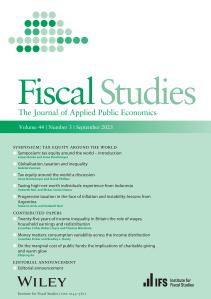The United Kingdom is not the fiscal monolith it once was. Until the devolution settlements of the New Labour era, tax and spending policy for all the constituent nations was set in Westminster. Today, the Northern Irish Assembly, the Welsh Senedd and the Scottish parliament have almost complete control over spending on public services. They can choose how to allocate their budgets between health, education, economic development and so on in ways that can, and increasingly do, differ from decisions made in Westminster and that affect only England.
However, the budgets they have to spend are largely set from Westminster. They are still based on the venerable Barnett formula, a supposedly temporary fix put in place in the dying days of the Callaghan government. It allocates funding to the other nations via a complex mechanism that broadly means the grants they receive from the Treasury change in proportion to changes in funding in England.
Even here, there has been some change. The Scottish and Welsh governments have some control over income tax, as well as over a handful of smaller taxes, and so have some ability to increase revenues or alter taxes to promote growth. After a long period of stasis, the Scots have made use of their powers over income tax, increasing the rates on higher earners and reducing them, slightly, on lower earners. The changes have been real and substantial, increasing revenues by about 4 per cent, or £500 million. Given that Scotland’s population is less than one tenth that of the UK, that’s equivalent to more than £5 billion in UK terms.
So good for them. They’ve used their powers to raise more money to spend on public services. Exactly the point of devolution. Except they haven’t ended up with any more money at all. That was the conclusion of a report by the Scottish Fiscal Commission published this month.
How can that be? Well, the devolution deal means that the amount of money the Scottish government receives depends on income tax revenues raised in Scotland. And because incomes have grown less quickly in Scotland than they have in the rest of the UK, revenues have grown less quickly. This is not a “Laffer curve” effect. Revenues didn’t fall because taxes were raised. It’s just that the Scots have been unlucky. Incomes north of the border have grown less quickly than elsewhere.
But that’s devolution for you. It brings responsibilities, accountability, potential reward — and risks. In this case, the risks have crystallised. The Scots could have had the same amount of revenue with lower tax rates if devolution had not happened. On the other hand, if their economy had grown faster, then devolution would have provided a fiscal dividend.
Another commission issued its interim report last week — the Independent Fiscal Commission for Northern Ireland, which I was asked to chair by Conor Murphy, the finance minister. We were given the task of looking at options for devolving taxes to Northern Ireland. At present, like Wales and Scotland, the Northern Ireland Assembly controls most public spending. Unlike the other two parliaments, and setting aside business and domestic rates, it has no power over tax. Nine months of work on the commission has persuaded me that there is plenty of scope for devolving taxes. We know from the experience of Scotland and Wales that income tax can be at least partially devolved, as can stamp duty on property transactions. There is no reason in principle why a slew of other taxes shouldn’t eventually be devolved to all three nations.
In the Northern Ireland context, there is a particular case for devolving corporation tax, given the much lower rate charged in the Republic and the urgent need to increase investment, and hence productivity and wages, in the low-wage, low-productivity Northern Irish economy. That will be possible only with co-operation and flexibility from the UK government. Any cut to match the Republic’s tax rate would significantly reduce Northern Ireland Executive revenues for at least a number of years. Previous negotiations over this have foundered partly on the issue of how to manage that revenue loss.
Excise duties on petrol, alcohol and tobacco might also be devolved. Given its land border with the Republic, optimal rates in Northern Ireland may well be different from those in the rest of the UK. Furthermore, the devolved governments have responsibility for public health but cannot alter duties on alcohol. That’s one reason Scotland was forced down the route of a minimum unit price for alcohol, increasing the profits of those selling alcohol rather than increasing tax revenues.
Of course there are challenges. Northern Ireland is small. Its population is almost precisely that of Kent and only a third that of Scotland. Its very size means that economic growth and tax revenues could be volatile. The administrative costs of devolving some taxes could also be high relative to revenues. As the Scottish experience illustrates, devolution is a double-edged sword. With potential reward comes risk. And devolution can work only on the basis of a productive and trusting relationship between, in this case, Westminster and Stormont.
Yet for all devolved nations, the real prize for them and for Westminster is the possibility of a more mature relationship, with each other and their electorates. Without substantive tax-raising powers. they will remain supplicants, asking for handouts. Or, as we see so often from the Scottish government, blaming Westminster for all manner of ills. More devolution of tax powers may be the best way to put the relationships on a more adult footing. Like a parent cutting the apron strings, the UK government perhaps should be willing to allow the devolved nations more freedom to make their own decisions. And their own mistakes.
This article was first published in The Times and is reproduced here with kind permission.










